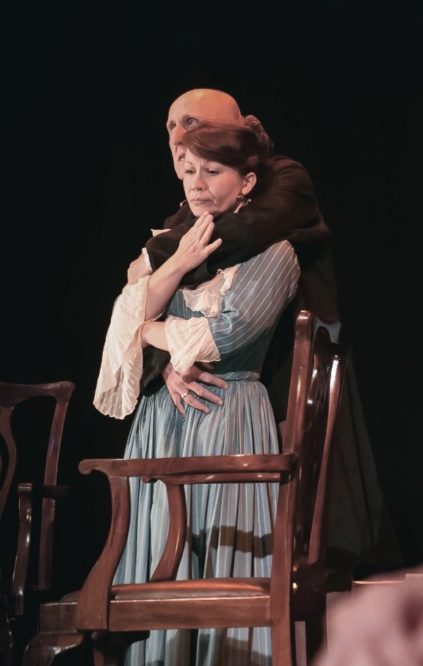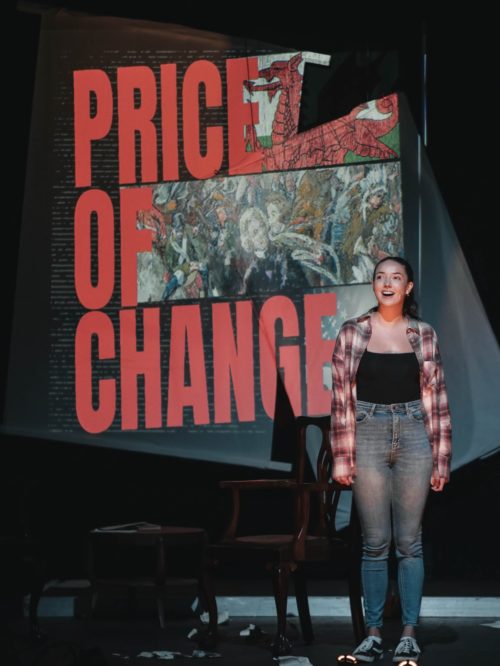Theatre review: Price of Change by Vic Mills, Contemporancient Theatre Company

Mike Winn
The credo of Contemporancient Theatre, ‘Heb Hanes, Heb Hunaniaeth’ (Without History, Without Identity), is well-served by their production, Price of Change, which seeks to revive and celebrate “Wales’ greatest thinker”, Dr Richard Price of Llangeinor in the Garw Valley.
Dr Price was born in 1723 and the play was initially written to celebrate his 300th anniversary, while posing the questions of why he has been partially erased as a UK historical figure and what the Wales of 2024 can learn from his ideas and principles.
It was extraordinary to learn that a figure who was lauded and celebrated as “the apostle of liberty” by revolutionaries in France and the USA was so demonised by reactionaries in the UK establishment that they effectively removed him from public memory.
It’s hard to argue that they have not succeeded.
While his contemporary, Tom Paine, was sung about by Bob Dylan in the 1960s, philosophers like Kant and Hume are relatively well-known and Benjamin Franklin and Alexander Hamilton are household names, even in Europe; Price was a greater polymath than all of them and made contributions to politics, philosophy, finance, insurance, mathematics and theology that helped shape the modern world.
His work on probability is considered by many to have enabled the development of AI in the 21st century, while 250 years ago his ideas were influencing the constitution of the nation that has gone on to dominate history for most of the years since.
And yet, even in Llangeinor, surveys of local people asked before this play was performed – in the community centre named after him – indicated that little if anything was known about him.
Confusion of Richard Price with a well-known builders’ merchant indicated that there was much work to be done in bringing him back to public consciousness.
Curiosity
Price of Change succeeds in firing up curiosity about Dr Richard Price and is an inventive, thought-provoking and entertaining production.
It avoids the pitfalls of biography and tells key aspects of Price’s story by weaving them into the narrative of a contemporary Llangeinor resident, Cari.
Cari is in limbo, a recent graduate of history at Aberystwyth, grieving the loss of her mother, she recognises that she may have to leave her home to find a future, but also feels compelled to support her widowed father, Alun.
He too is adrift, emotionally and politically. He strides about the stage in high-vis, carrying a hammer, torn between demolition and restoration of the building project he works on.
Political change
Cari wants to rebuild herself in a way that is positive, modern and progressive; she is bright-eyed and motivated by the thought of political change in Wales.
Alun, however, is fearful, a little cynical and clings to the idea of staying with what he knows and staying humble and loyal to his home.
Cari questions whether the price of change will require her to change herself or whether another kind of change is possible, even for a nation.
The scenes between Cari, played by Caitlin Ware, and her father, Alun, (Mike Church) embody the eternal debate between the younger, progressive generation and the more weary pragmatism of their parents.
They are poignant scenes, where Alun’s catchphrases are recognised with sympathy and resigned humour by Cari.
Inspiration
Interweaving with the 2020s Llangeinor are scenes set in Dr Richard Price’s drawing room in Newington Green in the latter stages of his life, from the 1770s to the 1790s.
There are glimpses into the marriage of Richard (Vic Mills) and Sarah (Caroline Bunce), where their affection and mutual respect was at odds with 18th century gender roles.
Price is visited by his great friend, Benjamin Franklin, who pleads with him to visit the USA and manage the nation’s finances.
He also proves an inspiration to a visiting Mary Wollstonecraft and supports her advocacy of the Rights of Women.
Price provides the moral support for taking to task the architect of the world’s greatest democracy on his failure to enfranchise women, which would require another 130 years to be realised.

Sanctimonious outrage
A less welcome visitor to the Price household is Edmund Burke. He is horrified by Price’s support for the French Revolution and with the extraordinary success of his pamphlets outlining his reasons for that support.
Burke embodies the sanctimonious outrage of a Daily Mail editorial and denounces the “swinish multitudes” that Price wants to enfranchise, educate and liberate.
There are eerie echoes of the way the modern establishment has a lukewarm enthusiasm for democracy unless the electorate can be trusted to be compliant.
The conflict between Price and Burke clearly has only one winner in terms of moral victory, but Burke’s influence and powerful friends soon see that Price is effectively “cancelled” as a public figure.
Pathos
There is real pathos in the scenes where the health of Sarah Price declines and he faces the prospects of a life without her.
Despite the sorrow at the loss of Price’s beloved companion, the play ends with an uplifting sense of promise. The past can seem like a foreign country, but it also belongs to us.
We can claim it, learn from it and be inspired by what has been done in the past to address the issues of the present.
While Cari and her father ponder the outcome of a vote on Welsh independence, there is a sense that the influence of Price can be a catalyst for change: liberty, equality and brotherhood perhaps – although Mary Wollstonecraft and Cari would expect a more inclusive term than the latter.

Academic heft
The action on stage is augmented by video film by Chris Lloyd; voiceover narration by the members of the local community and the cast; the excellent musical score created by Stephen J Preston; with Caitlin Ware beautifully singing the lyrics of Prof Kevin Mills.
The script by Vic Mills and the direction of Neil Maidman ensure that although the subject matter of “radical” philosophy and politics has academic heft, it also feels like a warm and relevant part of a discussion about the present and future of Wales.
Dr Richard Price may not yet be a lodestone of Welsh political identity in the way that John Frost, the Rebecca Riots, Merthyr Rising and Dic Penderyn are, but the existence and success of this play goes some way to redressing that.
The inventiveness of the script and the engaging performances of four agile and versatile cast members deserve a wider audience.
It’s provocative, original and entertaining: what more could you want from a trip to the theatre?
The Price of Change was originally funded by the Lottery and Bridgend County Council. The tour of Swansea, Merthyr, Cardiff and Newport has been supported by Cardiff University, with additional support from YesCymru.
Support our Nation today
For the price of a cup of coffee a month you can help us create an independent, not-for-profit, national news service for the people of Wales, by the people of Wales.





